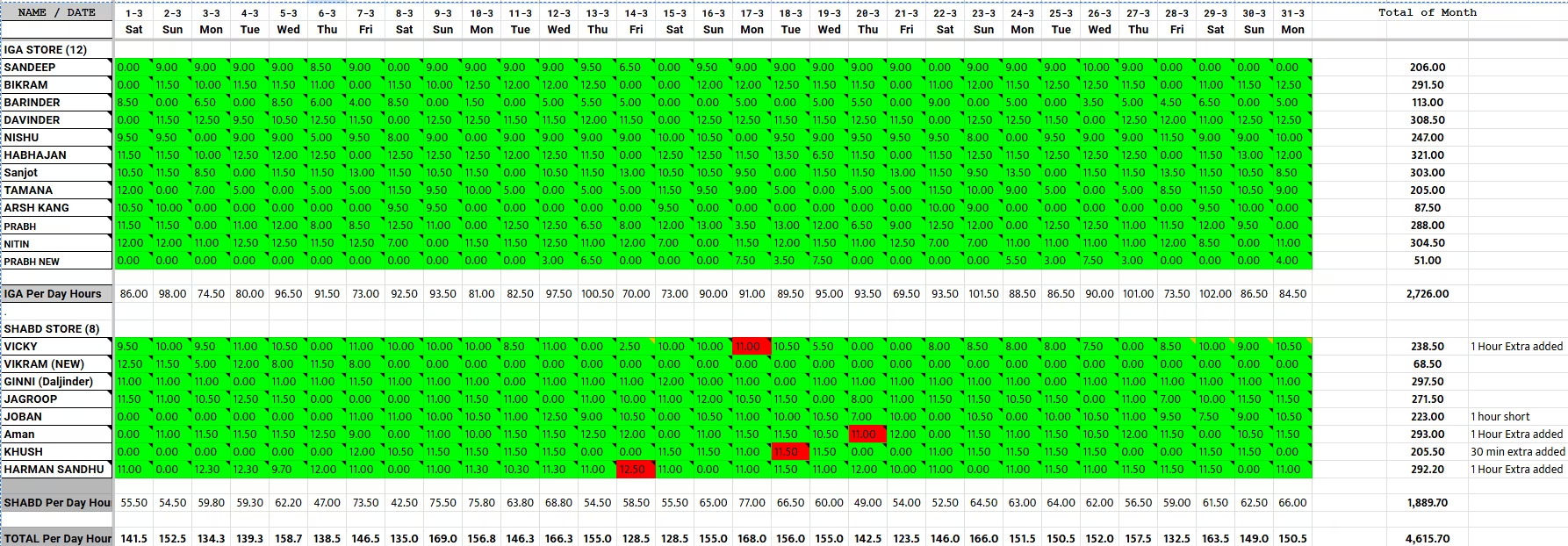SAHIL ALI - PORTFOLIO
Project 3
Ekam Indian Groceries Stores Adelaide SQL + Google Sheets
Automated tracking of employee hours using SQL and Google Sheets to flag discrepancies and ensure labor law compliance, reducing payroll errors and overtime costs.
1. Problem Statement
- Manual errors: Attendance and working hours were recorded manually, causing frequent mistakes like incorrect or missing hours.
- Lack of overtime control: Total working hours often exceeded budgeted limits, increasing labor costs.
- Payroll inaccuracies: Incorrect attendance data led to payroll errors and delays.
Attendance Sheet Snapshot
This snapshot shows attendance data for two stores for a month. Green cells indicate valid working hours (8-12 hours), red cells highlight invalid or problematic entries. Totals per employee and store are summarized.

2. Solution Developed
- Color-coded attendance sheet:
- Green cells mark correct time calculations.
- Red cells highlight incorrect working hour calculations.
- Relational SQL database:
- Architecture: Stores → Employees → Attendance with cascading foreign keys.
- Validation flag:
is_validmarks entries needing review.
- Time management controls:
- Enterprise limit: 4000 total hours/month enforced via database checks and spreadsheet formulas.
- Anomaly detection: SQL alerts and sheet conditional formatting for high usage.
3. Technology Stack
- Google Sheets: Data entry, validation, and collaboration.
- Mathematics: Calculations for daily hours, totals, and overtime.
- SQL: Structured storage, querying, and reporting.
- Features: Automated validation, visual indicators, real-time reporting.
4. Sample SQL Queries
-- Identify invalid attendance entries
SELECT e.name, a.work_date, a.hours_worked
FROM attendance a
JOIN employees e ON a.employee_id = e.employee_id
WHERE a.is_valid = FALSE
ORDER BY a.work_date DESC;
-- Calculate monthly total hours and status
SELECT
EXTRACT(MONTH FROM a.work_date) AS month,
SUM(a.hours_worked) AS total_hours,
CASE
WHEN SUM(a.hours_worked) > 4000 THEN 'OVER_CAP'
WHEN SUM(a.hours_worked) > 3800 THEN 'NEAR_CAP'
ELSE 'UNDER_CAP'
END AS status
FROM attendance a
GROUP BY EXTRACT(MONTH FROM a.work_date);
-- Early warning for employees nearing monthly limit
SELECT
e.name,
s.store_name,
SUM(a.hours_worked) AS employee_total
FROM attendance a
JOIN employees e ON a.employee_id = e.employee_id
JOIN stores s ON e.store_id = s.store_id
WHERE EXTRACT(MONTH FROM a.work_date) = EXTRACT(MONTH FROM CURRENT_DATE)
GROUP BY e.name, s.store_name
HAVING SUM(a.hours_worked) > 360;
5. Impact and Benefits
- Reduced errors by 70%: Color-coded validation enables quick correction.
- Overtime cost control: Monthly hour caps reduced labor expenses by ~15%.
- Payroll automation: Accurate data streamlines payroll processing.
- Saved 8+ admin hours/month: Less manual checking and corrections.
Business Impact: Cut payroll processing time, minimized overtime costs, and aligned labor management with business goals.
6. Future Enhancements
- Integration with payroll and HR systems for full automation.
- Real-time anomaly alerts via automated notifications.
- Advanced analytics dashboard for trends and forecasting.